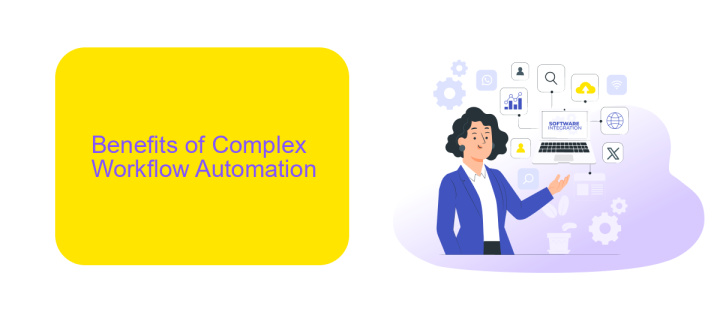Complex Workflow Automation
In today's fast-paced digital landscape, complex workflow automation has become essential for businesses seeking to enhance efficiency and reduce operational costs. By integrating advanced technologies and streamlined processes, organizations can automate intricate tasks, minimize human error, and accelerate project timelines. This article delves into the key components, benefits, and implementation strategies of complex workflow automation, offering insights into how it can transform modern enterprises.
Introduction
In the modern business landscape, the automation of complex workflows has become a critical factor for enhancing operational efficiency and achieving competitive advantage. Organizations are increasingly looking for ways to streamline their processes, reduce human error, and save valuable time. This is where workflow automation comes into play, offering a robust solution to manage intricate tasks seamlessly.
- Reduction in manual errors
- Time-saving through automated processes
- Enhanced productivity and efficiency
- Improved consistency and reliability
- Scalability for growing business needs
One of the key aspects of effective workflow automation is the integration of various tools and services. Platforms like ApiX-Drive provide a powerful means to connect different applications, enabling seamless data transfer and synchronization. By leveraging such integrations, businesses can ensure that their workflow automation strategies are both comprehensive and adaptable, ultimately leading to more streamlined operations and better outcomes.
Benefits of Complex Workflow Automation

Complex workflow automation offers numerous benefits, significantly enhancing efficiency and reducing manual errors. By automating repetitive tasks, organizations can save valuable time and allocate resources to more strategic activities. This leads to increased productivity and allows teams to focus on innovation and growth. Additionally, workflow automation ensures consistency and accuracy, minimizing the risk of human error and improving overall quality of work.
One of the key advantages of complex workflow automation is seamless integration with various tools and platforms. Services like ApiX-Drive facilitate this process by enabling easy connections between different applications, ensuring a smooth data flow. This not only streamlines operations but also provides real-time insights and analytics, aiding in better decision-making. Furthermore, automated workflows can adapt to changing business needs, offering scalability and flexibility that manual processes simply cannot match.
Key Considerations for Complex Workflow Automation

When automating complex workflows, it is crucial to consider several key factors to ensure efficiency and effectiveness. Understanding these considerations can help streamline processes and avoid potential pitfalls.
- Scalability: Ensure that the automation solution can scale with your business needs as they grow.
- Integration: Choose tools like ApiX-Drive that offer seamless integration with various applications and services to streamline data flow.
- Flexibility: The solution should be adaptable to different workflows and capable of handling exceptions and customizations.
- Security: Implement robust security measures to protect sensitive data and maintain compliance with regulations.
- Monitoring and Maintenance: Regularly monitor the automated workflows and perform necessary maintenance to ensure smooth operation.
By focusing on these considerations, organizations can effectively implement complex workflow automation that enhances productivity and minimizes errors. Leveraging tools like ApiX-Drive for integration can further simplify the process, ensuring seamless connectivity across various platforms.
Case Studies in Complex Workflow Automation

Complex workflow automation has become a cornerstone for many businesses seeking to streamline operations and enhance productivity. One notable case study involves a mid-sized e-commerce company that integrated multiple platforms to automate its order processing, inventory management, and customer service workflows. By leveraging automation tools, they achieved significant reductions in manual labor and error rates.
Another compelling example comes from a healthcare provider that automated patient appointment scheduling and follow-up processes. Utilizing advanced workflow automation, they managed to improve patient satisfaction and reduce administrative overhead. The integration of various software solutions played a critical role in this transformation.
- ApiX-Drive facilitated seamless integration between CRM, email marketing, and accounting software for a financial services firm, enhancing data flow and operational efficiency.
- A manufacturing company used workflow automation to synchronize production schedules with supply chain management, reducing delays and optimizing resource allocation.
- In the education sector, a university automated student enrollment and course scheduling, significantly reducing administrative tasks and improving the student experience.
These case studies highlight the transformative potential of complex workflow automation across various industries. Tools like ApiX-Drive enable businesses to easily integrate disparate systems, ensuring a cohesive and efficient operation. By adopting such solutions, organizations can not only streamline processes but also gain a competitive edge in their respective markets.
Future of Complex Workflow Automation
The future of complex workflow automation is poised for significant advancements, driven by the integration of artificial intelligence and machine learning technologies. These innovations will enable systems to not only automate repetitive tasks but also to adapt and optimize processes in real-time. By leveraging predictive analytics, organizations can anticipate workflow bottlenecks and proactively implement solutions, resulting in increased efficiency and reduced operational costs.
Moreover, the rise of no-code and low-code platforms will democratize the ability to design and deploy automated workflows. Services like ApiX-Drive are already making it easier for businesses to integrate various applications without the need for extensive programming knowledge. This trend will continue to grow, allowing even small and medium-sized enterprises to harness the power of complex workflow automation. As these technologies evolve, we can expect a future where seamless, intelligent automation becomes a standard component of business operations across industries.


FAQ
What is Complex Workflow Automation?
How can Complex Workflow Automation benefit my business?
What types of processes can be automated?
How do I get started with automating my workflows?
Is it difficult to maintain automated workflows?
Apix-Drive will help optimize business processes, save you from a lot of routine tasks and unnecessary costs for automation, attracting additional specialists. Try setting up a free test connection with ApiX-Drive and see for yourself. Now you have to think about where to invest the freed time and money!

